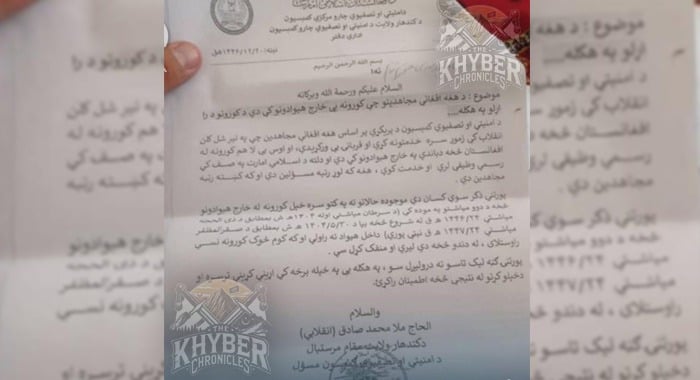The Afghan Taliban have issued a sweeping directive requiring all members of the movement including senior leaders and fighters currently residing outside Afghanistan to return to the country within two months. The directive warns that failure to comply will result in removal from all official positions within the Taliban’s structure.
The order, issued by the Taliban’s Security and Settlement Committee and distributed through the Commission for Memorial Affairs, applies to all members whose permanent residences remain abroad. A copy of the official letter has been reviewed by this publication.
“Any Taliban leader or fighter who fails to return to Afghanistan within the stipulated two-month period will be relieved of their responsibilities,” the letter states.
The directive is being seen as an effort by the Taliban leadership in Kabul to centralize control, enforce internal discipline, and reduce the influence of members operating from abroad particularly in neighboring Pakistan, where many Taliban figures have long maintained residences and businesses.
Although the Taliban seized control of Kabul in August 2021, numerous senior officials and commanders are believed to have continued living outside Afghanistan. The new order draws renewed attention to this longstanding dynamic, wherein key figures directed insurgent operations from abroad during the two-decade war and have remained outside the country even after the group’s return to power.
Sources within anti-Taliban Afghan circles claim a list will soon be published naming Taliban officials who have yet to relocate to Afghanistan and whose families and financial interests remain abroad. Among those reportedly included is Amir Khan Muttaqi, a senior Taliban official whose family allegedly owns businesses and property in Pakistan. One of his brothers is said to be affiliated with Jamiat Ulema-e-Islam (F), a prominent Pakistani religious political party.
Analysts view the directive as a potential turning point within the Taliban’s internal structure, as it seeks to assert Afghan-based leadership over diaspora elements. It may also reflect increasing friction between the Taliban government and regional actors, amid growing scrutiny over cross-border affiliations and foreign-based influence within the group.
The Taliban have not yet publicly commented on whether exceptions will be granted, nor have they disclosed how compliance will be monitored or enforced.





